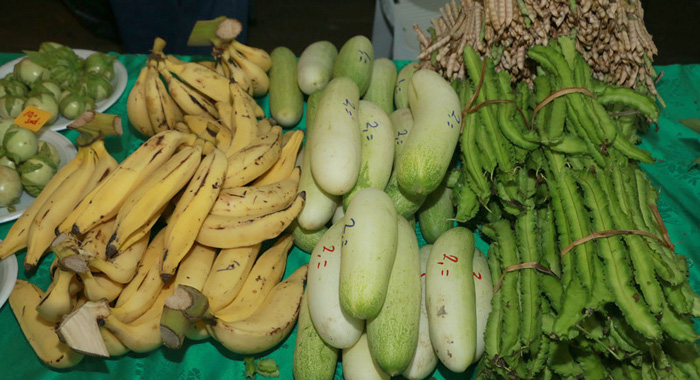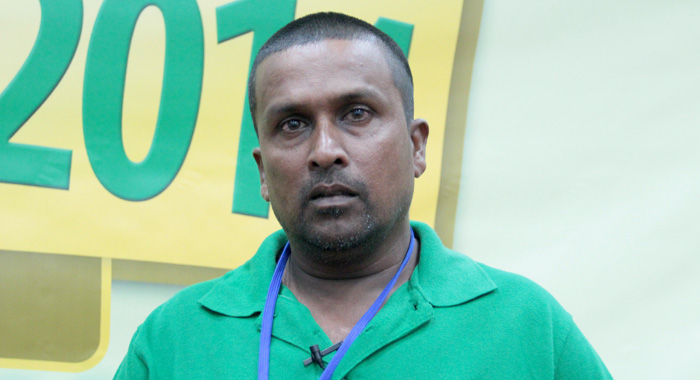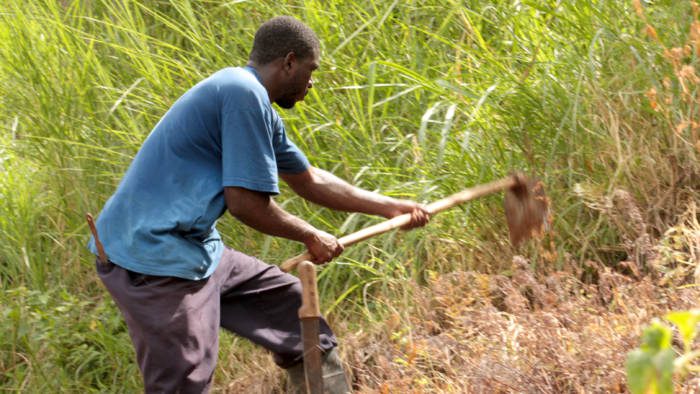By Kenton X. Chance
PARAMARIBO, Suriname — To hear Ramgopaul Roop talk about his three-acre family farm in central Trinidad is to hear a man beaming with pride about how his most successful business venture yet has educated his sons, built his home, and generates the income he needs to survive.
“From the farm, we have been able to build our family home, we have been able to educate our children, three boys, one is an engineer and two are specialist surgeons now,” he told a session of the 13th Caribbean Week of Agriculture (CWA) here earlier this month.
CWA was held under the theme “Transforming Caribbean Agriculture through Family Farming”.
Roop’s pride is justified. He belongs to one of thousands of farm families, who, together, account for more than 80 per cent of agricultural production and generate more than 50 per cent of agricultural employment in Latin American and the Caribbean, according to the United Nations Food and Agriculture Organisation (FAO)
Many Caribbean farmers might not be familiar with the relatively new term “family farming”, but it describes a type of agriculture with which the region has long been familiar. So important is this type of agriculture, that the United Nations declared 2014 the International Year of Family Farming.
Family farming is not easily defined, but its key characteristics include limited access to land and capital resources; the predominate use of family labour, with the head of the household participating directly in the production process; and farming as the main source of household income for the family nucleus.
FAO coordinator of the Caribbean region, Deep Ford, highlighted the important role of family farms in the 15-member, food-insecure Caribbean Community (CARICOM), where the combined food import bill sky-rocketed from US$2.08 billion in 2000 to US$4 billion in 2008 and surpassed US$4.25 billion in 2011.
“Family farms have been the backbone of the food systems and our food security across the region,” he said, noting the negative descriptions that are often ascribed to family farmers.
“What is sad when we speak about family farmers and when we speak about small farming, is that we often say the term small and vulnerable farmers, small and poor farmers,” he said, acknowledging the importance family farmers have made to food security across the world.
“These are the farmers, these are the producers, these are the families who have taken their baskets, taken their truckloads of produce, fruits and vegetables into the cities and have fed the Caribbean over many years,” he said.
But while there are many success stories across the region, there still remain many challenges to the viability of the sector, including government policy, succession planning, predial larceny and climate change.
Ford called for “equitable public policy” that recognizes the importance of profits and “inclusion as a part of the framework.
“Basically, we have not supported our small farmers and our family farmers in this regard. What we have in fact done is encourage large-scale farmers, and we have given them a lot of concessions to come into the countries and produce,” he said, pointing to his home country, Guyana, as an example.
Chief co-ordinator of the Caribbean Farmers Network, Jethro Greene, was more explicit in his criticism of CARICOM’s attitude to family farmers.
“… within the region, the international year of the farm family has been received with lukewarm feeling, a reflection of how low agriculture is still on the scale of priorities in the region,” he said.
Greene said the region, amidst its own calls to move agriculture forward, wasted an opportunity to put agriculture and farm families at the centre.
“It is a contradiction and I am disappointed,” Greene said.

In addition to his call for a change in government policy, Ford highlighted a “need” for succession planning, saying, “we need youth to be involved and to be perceiving farming as a profession”.
He said CARICOM has given farm families good reasons to leave the agricultural sector, adding that the region has taken away from small farmers the minimum wage that they were once offered through price guarantees for products.
Director of the ACP/EU Technical Centre for Agricultural and Rural Cooperation (CTA), Michael Hailu also spoke of the importance of succession planning in family farming.
Hailu said young people can and should play a role in supporting agricultural development, in light of an ageing farmer community in the Caribbean and across the African, Caribbean and Pacific Group of States (ACP).
“That is why we at CTA are making a special effort to encourage young people to engage in agriculture — in ways that they can relate to, using new technologies that are far removed from the old image of farming,” he said, noting CTA’s competitions aimed at youth and at the innovative contributions they can make to agricultural and rural development in the Caribbean.
At Roop’s farm, none of his sons are involved in the actual production of agricultural produce, but have invested capital, including the air-conditioned vehicle that he uses to take the harvested dasheen to the supermarket.
But investments in agriculture might not be so attractive for the children of Guyanese produce and livestock farmer, Nazim Ali Mohamed.
“In the night, there are people moving to and fro in the Essequibo River, and when you wake up in the morning, you find that, one, two cattle are gone,” he said, and called on the Guyana government to do more to monitor the movement of livestock via the Essequibo River.
He said the authorities should monitor butchers.
“Police can play a part in the different locations. Any movements of animals, you are supposed to check to get a pass. If you enforce that, at least you can track some of the cattle rustling,” Mohamed said.

Jamaica, which has CARICOM’s largest food bill, is also facing an uphill task in dealing with praedial larceny.
But Jamaican journalist Christopher Serju, who covers the agriculture beat, said that while praedial larceny is a major problem, Kingston is not taking it as seriously as it should.
“Farmers lose an estimated six billion Jamaican dollars each year. Even though it has evolved into an organised criminal activity, it is still seen as a simple crime,” Serju said. (One Jamaica dollar =US$0.002 cents)
“You go to report that a cow was stolen, you spend the whole day at the police station and they tell you they are dealing with serious crime, when they are finished they will deal with you about it,” Serju explained.
He said that praedial larceny has a significant negative impact on intergenerational poverty in farm families.
“… the cow that was stolen, the crop that was robbed was going to be used to pay the child’s school fee,” he said, adding that praedial larceny also makes agriculture less attractive for children of farmers.
“Children who see their mothers and fathers getting frustrated, losing their hard-earned value over time will not get into and will make a determined effort to move away from farming. So, in terms of the succession planning, you are not likely to get that. We are losing out in terms of the human resource element also,” Serju said.
The CARICOM deputy Secretary-General, Dr. Manorma Soeknandan, said that the region’s agricultural sector consists mainly of small family farms.
“The challenge is to ensure that we have in place the appropriate policy and institutional framework that is supportive of family farming particularly with respect to education, technology, financing, marketing and other services,” she said.
Such policies are needed to ensure that more family farmers can proudly boast, like Trinidad’s Roop, about the ways in which his farm has improved their material circumstances.







Good story from a good journalist.
I’d like to make what I consider a very relevant point.
I certainly think CARICOM and individual Caribbean governments are out to lunch vis a vis Agriculture because no government really wants citizens to be truly independent of government control and handouts.
Yet how can we have family farming if the farmers’ family pursue tertiary education in everything else but education in farming?!! And I quote from this on-point Kenton Chance story:
“From the farm, we have been able to build our family home, we have been able to educate our children, three boys, one is an engineer and two are specialist surgeons”
Success planning indeed. Was that farmer encouraging his children to pursue farming or “something better”? The truth is Law, Engineering and Medicine remain simply ego-driven careers.
It is farming that makes us truly independent because, in the end, Maslow’s Hierarchy of Needs is a fact of life and food is a number one need right up there with water sleep and breathing.
Unless we truly take agriculture off ‘The Plantation’ and clean up our dirty chemical act we will continue to have armchair discussions on this art that has been transformed into a formula and we will not get any succession in a sector that today has more value in votes than in nutritious food.
The people talking most about agriculture are not farming and farmers are generally fed up of talk!
My advice to farmers is keep feeding yourself and families and making a little cash if you can.
Better times are coming, but only after you vote out the ULP, who have destroyed agriculture.
They have destroyed agriculture and they have destroyed you and your family fortune.
They once said agriculure time is gone, it’s now time for tourism. But they have ended up destroying both agriculture and tourism.